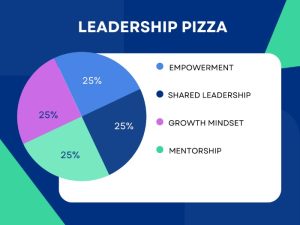Supporting Leadership: Post-Secondary School Learners
For post-secondary school learners, the ways in which you support leadership skills starts to grow in complexity. Read on to learn more about how you can incorporate leadership-related activities with your learners.
Thinking About Leadership (‘I’)
Self-Assessment Strategies
Self-assessment strategies can help adult learners identify their leadership strengths and areas for growth. The Leadership Pizza (SessionLab) provides a visual framework for adult learners to identify the abilities, qualities, and attitudes they believe are crucial for effective leadership, and then to evaluate their own development in these areas. This might look like…

Once learners have identified their areas of strength and areas of need, work with learners to establish personal leadership development objectives and goals.
Grit and Resilience
Grit and resilience are also important leadership skills, and can move adult learners closer to a growth mindset. A great starting point for adult learners might be to understand their level of grit. Dr. Angela Duckworth, a prominent researcher on grit and resilience, created a Grit Scale that measures an individual’s passion and perseverance. After learners have completed the assessment, invite them to explore and reflect on their strengths and areas of need. Next, have your learners write or record their grit story, a story about a time they persevered through a challenge or obstacle.
How Gritty Are You?
So, how gritty are you? When you are ready, check out Angela Duckworth’s Grit Scale to find out.
The video below can help introduce this assignment, followed by an example of a real-life grit story. Take a look!
At the end of the semester or year, have your learners reflect on what they have learned about grit and, in six words, tell their semester grit story.
Feeling Leadership (‘We’)
Mindfulness
The practice of mindfulness can help adult learners become more mindful in everyday life by learning to “intentionally pay attention in a kind, open, and discerning way. When we are mindful, we focus on the present moment non-judgmentally” (Greater Good Science Center, 2024, para. 1). When we have greater self-awareness we start to develop greater social awareness. You can move learners toward greater mindfulness, including self- and social-awareness, by weaving mindfulness practices into your course or classroom. For example, self-compassion breaks can help learners reset and recharge, while also learning to accept themselves, and others, as they are.
How Would You Treat A Friend?
- Begin by thinking about times when a close friend of yours feels really badly or is struggling in some way. How do you respond to your friend in these situations (if you’re at your best)? Please write down what you typically do and say, and note the tone in which you talk to your friend.
- Next, think about times when you feel bad about yourself or are struggling. How do you typically respond to yourself in these situations? Please write down what you typically do and say, and note the tone in which you talk to yourself.
- Did you notice a difference? If so, ask yourself why. What factors or fears come into play that lead you to treat yourself and others so differently?
- Write down how you think things might change if you responded to yourself when you’re suffering in the same way you typically respond to a close friend.
- Next time you are struggling with something, try treating yourself like a good friend and see what happens.
*This is an excellent activity to practice with your adult learners*
Source: Kristin Neff, Center for Mindful Self-Compassion Greater Good in Education
Group Project-Based Learning
Group project-based learning can also present opportunities for adult learners to develop their leadership skills, while simultaneously learning to be active listeners and curious contributors. In this activity, you can pair learners with a partner (or have them select their partner). Through conversation, discussion, and active listening, each partner is responsible for noticing and celebrating their partner’s grit or growth mindset. You might have them write and/or record a six word memoir of the other person’s grit story, or write a reflection piece based on what they have learned about their partner’s grit story (Lone Star College, 2024).
Practicing Leadership (‘Us’)
Peer Mentorship
How can you support your adult learners to act in ways that are empowering, celebrate growth and diversity, and foster a mentor-mentee relationship? Peer mentoring programs can offer your learners opportunities to enhance their leadership and interpersonal skills, while simultaneously exploring real-world learning environments. For example, if you work with pre-service teachers, consider a partnership with a local school board to practice their emerging educator skills. If you teach computer science, is there a local STEM club or robotics competition your learners can support? Can your upper-year learners provide peer support, guidance, and mentorship to first-year learners?
Letter To Your Future Self
You might also invite your learners to write a letter or create a video to their future selves, reminding them of all the struggles they have already overcome. In this video If I Knew Then: A Letter To Me on My First Day of Teaching, a group of teachers write letters to themselves on their first day of teaching. Use it as inspiration for your learners to take action and move toward a stronger, more resilient and grittier version of themselves (Lone Star College, 2024).

